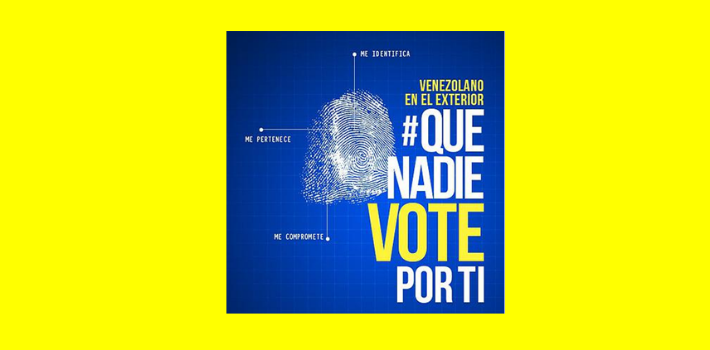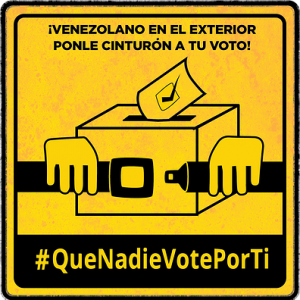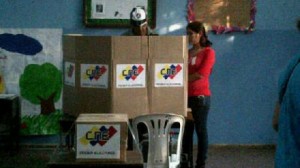
EspañolAs the December 6 election approaches in Venezuela, the opposition has launched a campaign to prevent vote rigging.
The campaign #Don’tLetAnyoneVoteForYou (#QueNadieVotePorTi) aims to register Venezuelans living abroad, since they are not authorized to vote in the next legislative elections.
Venezuelans living outside the country — who can vote in presidential elections but not in legislative ones — are asked to register their national ID number, confirming that they won’t be able to vote. According to the campaign’s promoters, the initiative will protect them from “possible identity theft.”
Recent elections have been blemished with allegations of individuals voting more than once with different ID cards, and even of votes cast by the dead.

The information submitted to the registry will be delivered to poll watchers, who will verify which citizens are not allowed to vote due to their residence abroad.
Roberto Abdul, head of the NGO Súmate — which has overseen previous elections — tells the PanAm Post that the campaign would allow voters to control the controversial National Electoral Council (CNE).
He says that, although the number of reports of identity theft are low, it is still important to identify who is able to vote and who isn’t.
Voting Irregularities Favor the Government
Abdul admits that no instance of fraud was confirmed for the last elections. He claims, however, that the manipulation takes place when the CNE enters the scene and begins to favor the government.
He said that the most common irregularity reported is the use and abuse of government resources — including infrastructure and human and financial resources — to sway the vote in the ruling party’s favor.

He mentioned the inauguration of public works during the presidential race as one of the most frequent tricks. Voters also have to endure the presence of security officers or activists belonging to the ruling United Socialist Party of Venezuela (PSUV), who stand next to voting machines and try to compel them to vote for their party.
This type of “assisted vote,” however, is not illegal. It’s common, in fact, for the elderly and disabled to vote alongside a person of their trust who can help them operate the voting machines.
Abdul says that there have been cases of “unscrupulous opportunism,” however. The National Institute of Statistics, for instance, changed population estimates to benefit the government, as districts historically regarded as opposition strongholds saw a suspicious decrease in population.
On October 29, Súmate filed a complaint against Venezuelan President Nicolás Maduro for using government resources to campaign for the PSUV. Súmate Vice President Edgar Saldivia asked the CNE to penalize Maduro for allegedly promoting candidates in 17 different speeches.
Venezuelan law bans the use of government resources in the presidential race. Starting a campaign before the date set by the CNE is also forbidden.
[adrotate group=”8″]
Súmate’s complaint requests a fine of “5,000 to 7,000 fiscal units” (between US$12,000 to $16,000, according to the official exchange rate) for “using the [government-owned] media platform at 17 partisan events.”
National Assembly Speaker Diosdado Cabello, who is looking to win reelection to Congress, was also included in the complaint for “using government assets to strengthen his position and that of his fellow PSUV candidates” ahead of the elections.
So far, the CNE has remained silent on the matter.
International Watchdogs “at Risk”
Venezuelan law does not permit international observers to oversee local elections, but it does allow the presence of foreign delegations on voting day as long as they are registered at the CNE.
Brazil’s Supreme Electoral Court recently announced that it won’t send delegates to Venezuela as part of the Union of South American Nations (UNASUR) regional bloc, since Venezuelan authorities didn’t guarantee “an objective and impartial overseeing process.”
On October 30, the Uruguayan Electoral Court (CEU), which heads the UNASUR Electoral Council, warned that the observation mission “is at risk” of not being able to meet its objective for the Venezuelan election.
An official CEU document notes that, “if it is not possible to organize the mission in a timely manner,” the Electoral Council will cancel the assignment in order to protect UNASUR’s reputation as a body that favors democratic exercises in the region. The document also expressed the possibility of canceling the mission to Venezuela in order to upkeep UNASUR’s “prestige earned at the international level.”
“We have appointed neither a chief of mission nor a general coordinator,” CEU member Pablo Klappenbach said.
Amid the uncertainty over the presence of UNASUR watchdogs, CNE Chair Tibisay Lucena said that there is time left for UNASUR to take part in the election process. At the present moment, however, the 12 foreign ministries that comprise the organization have not signed an agreement to oversee the elections.
Lucena also dismissed the request of some 500 international watchdogs to observe the elections, including the Organization of American States and the European Union.
 Versión Español
Versión Español












